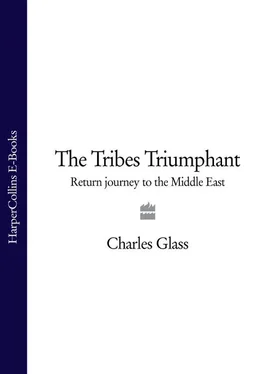1 ...6 7 8 10 11 12 ...31 We marched across the quad, up and down the circling staircases, and along the ramparts. We saw where the Turkish soldiers had slept, where they ate and the vast chambers in which they received their imperial commands from the Prophet’s successor on earth, the Sultan-Caliph, in Istanbul. The dates of the inscriptions accorded to the Muslim lunar calendar. ‘We are in the year 1422,’ Mr Amrin informed me. ‘That is 5762 or 63 in the Jewish calendar.’ The Muslim Year One was AD 622, the time of Hejira, Mohammed’s flight from Mecca to Medina.
What fascinated me was Mr Amrin’s interpretation of history. No two people, no two books, related the fables in the same way. The teller might be an Arab, an Armenian, a Turk or an Israeli. Each saw the world from the vantage of his religion, his sect, his school of philosophy and of law, his village, his tribe, his family. Mr Amrin was born in Kerak, known in Jordan for a beautiful Crusader castle and its Bedouin hospitality. ‘The first place the Muslims got to,’ he said, referring to Islam’s earliest forays outside the Arabian peninsula, ‘was Kerak. It was called Mu’ata, and it had a famous university. There, they had their first clash with the Christians.’ They lost. Two thousand Muslim horsemen needed more than belief to vanquish a force of 200,000 Byzantine regulars. ‘The Muslims had to withdraw,’ Mr Amrin said. ‘Three of their leaders were killed in that battle, and they elected Khalid bin Walid in the field.’ That was in AD 690. Seven years later, Khalid bin Walid led the Muslims to victory against Byzantium’s forces at Yarmouk. As the British and Arabs would dispatch a weakened Ottoman Empire north to its Anatolian heartland in 1917 and 1918, the Muslims of Arabia drove the Greeks from Syria to their defences beyond the Beilan Pass in Asia Minor. If the Byzantines had held at Yarmouk, if the Turks had stopped Lawrence at Aqaba, if …
Empires always get it wrong, something my country was learning, and denying, in the Middle East and the Asian subcontinent. The Ottomans, however nostalgic I may have been for the splendour of their court and the tolerance of their pre-First World War governors, also failed. ‘You know Kerak?’ Mr Amrin asked. I did. The Bedouin there had invited me to a huge mensef – a feast of boiled mutton and rice served on a communal platter that we ate without knives, forks or bread – twenty years before. Its Crusader castle had fascinated me. Its markets overflowed, its women were the most beautiful, its lambs the tastiest … I rhapsodized like an Arab court poet. Mr Amrin was not interested in my memories of Kerak. He had his own: ‘In 1910, Kerak had a famous revolt. The Ottomans sent people to the top of the tower and threw them down. Sixty-five people. They had refused to work in the army. This created anger against the Turks. After that, it was easy for Sherif Hussein bin Ali. The people were ready.’
An ingenious system of rain gutters and cisterns had kept the Turkish garrison in Aqaba supplied with water for men, animals and crops. A giant granite millstone had ground the wheat for their bread. Indicating the rust-red hills above Aqaba, Mr Amrin said the granite for the millstone and to construct the walls had come, like Lawrence’s surprise invasion, from there. When he said the rocks were from the pre-Cambrian period, I nodded as if I knew when that was.
‘This castle,’ Mr Amrin added, bringing the story forward several millennia, ‘was used as a khan for pilgrims from Egypt.’ The land route to Mecca passed through Aqaba, until Israel occupied the Negev and Eilat in 1949. Pilgrims, at least those who did not take the sea route from Suez to Jeddah, would have found within Aqaba’s caravanserai the water, the camel forage and the imperial protection they needed to continue south through the desert to Mecca and Medina. Those with more time or fervour added Jerusalem, where their father Abraham had attempted to sacrifice his son Isaac on an altar of stone that had, since the seventh century, been sheltered within a golden-domed mosque.
This citadel belonged in Aqaba, while the town’s steel and cement hotels and offices might have been in Marbella or Atlanta. New high-rise projects for Aqaba’s poor used gas heating in winter and electric air conditioners in summer, wasteful and unreliable. The Mamluke architect Khair Bey al Ala’ai knew what he was doing in the sixteenth century. He erected a fortress of clay roofs, arched and open to the breezes, with ramparts of stone mixed with clay. And it held until the twentieth century. ‘This is perfect for the climate,’ Mr Amrin said. ‘It’s cool in the sun, then warm in winter. It’s not like it is if you live in cement.’ Mr Amrin, since he had moved with his family from Kerak, lived in cement.
We ascended the staircase, following a Russian couple and their young daughter, to walk the ramparts. From the walls, Mr Amrin showed me his adopted city. ‘You see the buses?’ An array of camel-beige coaches glided through the town. ‘Aqaba is not just a tourist centre. It does business. Those buses are taking people to jobs.’ In the south-east, ships were waiting to dock. Mr Amrin said four ports made Aqaba a commercial hub: one harbour each for cement, phosphates, cargo and passengers. The caravan-like stream of buses carried workers back and forth to ports that worked around the clock. The sea trade meant that Aqaba could survive without tourists. Not all that well, if the squalor of its old city indicated anything, but well enough. There seemed to be two losers amidst the mirage of Aqaba’s prosperity: big hotel owners and Iraqi refugees. The hotel’s shareholders – who lived in America, Japan and Europe – could sell or wait or close down. The Iraqis starved.
‘You see those women in black?’ Mr Amrin asked me. This was later in the afternoon, when I was hotter and thirsty. We had left the fortress and were walking in the town’s commercial heart. All I wanted was a cup of coffee, but Mr Amrin, leading me with casual indifference past beckoning cafés and the fragrance of coffee boiling with cardamom, had a favourite place that seemed to lie miles away. ‘You see those ladies?’ he repeated. I saw them, squatting on the pavement, their backs against concrete walls, veils shading their foreheads. They were handsome-looking women, who, despite opening their palms to receive coins from strangers, retained more dignity than many who had grown up as beggars. ‘They are from Iraq. They were very rich people.’
I had seen women like them in Baghdad, once the most prosperous and modern city in the Arab world. In the first years after the war over Kuwait and under an international boycott, they sold their jewellery. Next came the silverware, the old books and the Irish linen that foreigners like myself could buy from outdoor stalls downtown in what Baghdadis called the ‘thieves’ market’. I was never sure whether the thieves were the sellers or the buyers. In time, the paintings went, then the extra furniture, the kitchen appliances, the better clothes. Finally, some of the women – and these had been among Iraq’s proudest and best-educated – sold themselves. A British television cameraman in Baghdad had told me he had sex with an upperclass Iraqi woman while her husband waited alone in a bare living room for them to finish. The cameraman then had coffee with them both, as if he had been an invited guest, before leaving a discreet gift of one hundred dollars. The American embargo starved and bled Iraq for twelve years, until the American invasion of 2003 made life there even more precarious.
The two Iraqi women in black had, nestling in the folds of their cotton cloaks, about three Jordanian dinars between them. With that, they could have bought a sandwich each at any of the cafés I longed to stop at. At the Movenpick, which was the sort of place they had once been accustomed to, they might have shared one cup of tea.
Читать дальше












